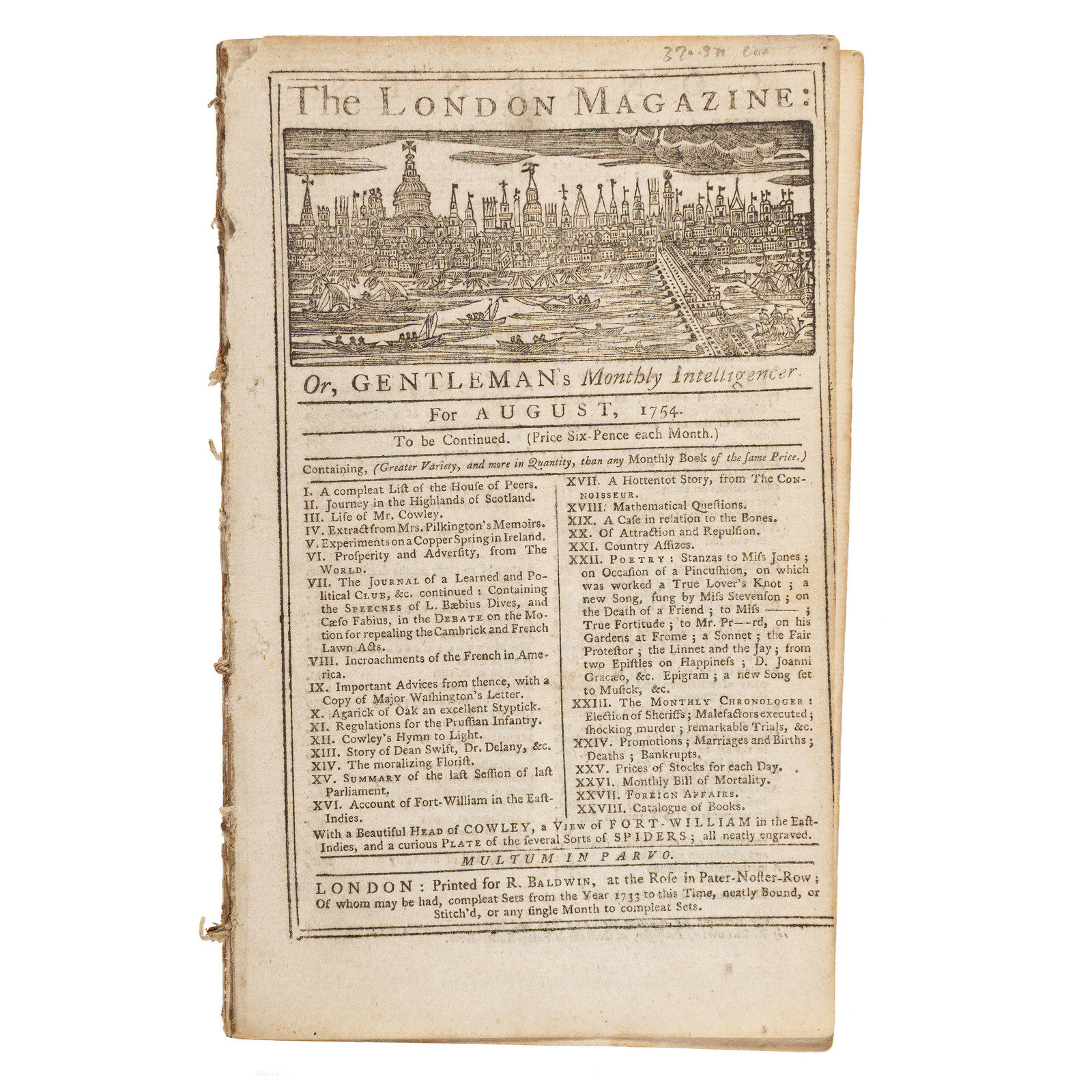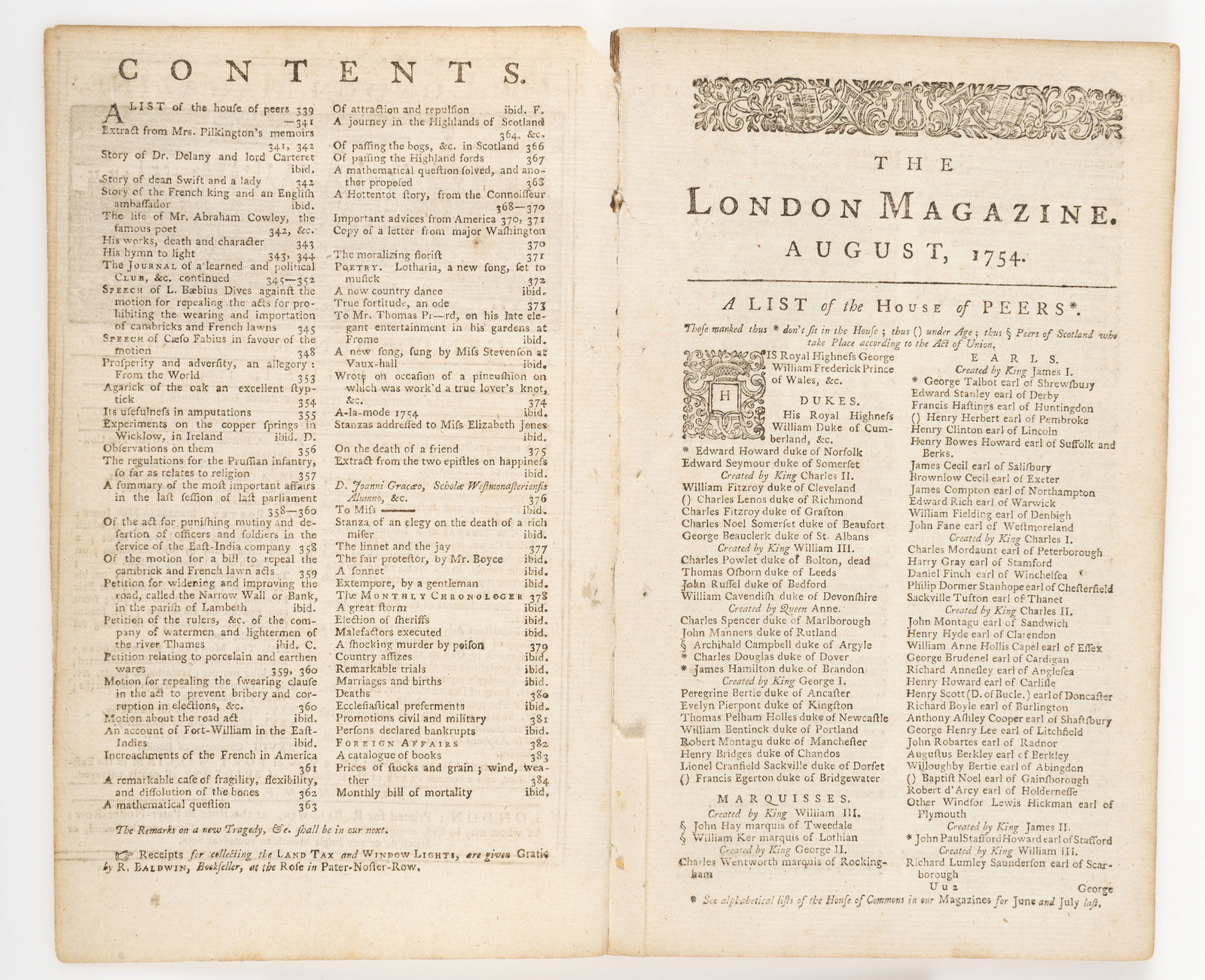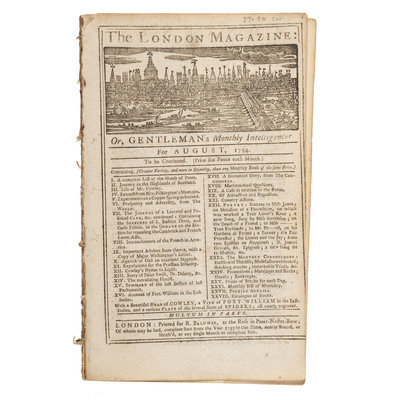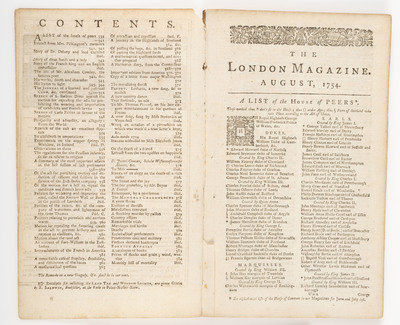[FRENCH & INDIAN WAR - BATTLE OF JUMONVILLE GLEN]. The London Magazine: Or, Gentleman's Monthly Intelligencer. London: R. Baldwin, August 1754.
Sale 926 - American Historical Ephemera & Photography
Aug 20, 2021
10:00AM ET
Online / Cincinnati
Estimate
$1,000 -
$1,500
Item was unsold
Lot Description
[FRENCH & INDIAN WAR - BATTLE OF JUMONVILLE GLEN]. The London Magazine: Or, Gentleman's Monthly Intelligencer. London: R. Baldwin, August 1754.
Pages 339-383, 5 x 8 1/4 in. Disbound (some leaves partially separated from spine, some chipping at edges.) One engraved plate.
News magazine containing inside page, 2-column eyewitness account by George Washington of the Battle of Jumonville, the opening battle of the French & Indian War (pp. 370-371). One of the earliest printings of a significant event described by Washington marking the very beginning of the French and Indian War.
The Battle of Jumonville Glen, also known as the Jumonville affair, was the opening battle of the French and Indian War, fought on 28 May 1754, near present-day Hopwood and Uniontown in Fayette County, Pennsylvania. A company of colonial militia from Virginia under the command of Lieutenant Colonel George Washington, and a small number of Mingo warriors led by Tanacharison (also known as "Half King"), ambushed a force of 35 Canadiens under the command of Joseph Coulon de Villiers de Jumonville.
A larger French Canadian force had driven off a small crew attempting to construct a British fort under the auspices of the Ohio Company at present-day Pittsburgh, PA, land claimed by the French. A British colonial force led by George Washington was sent to protect the fort under construction. The French Canadians sent Jumonville to warn Washington about encroaching on French-claimed territory. Washington was alerted to Jumonville's presence by Tanacharison, and they joined forces to ambush the Canadian camp. Washington's force killed Jumonville and some of his men in the ambush and captured most of the others. The exact circumstances of Jumonville's death are a subject of historical controversy and debate.
Since Britain and France were not then at war, the event had international repercussions and was a contributing factor in the start of the Seven Years' War in 1756. After the action, Washington retreated to Fort Necessity, where Canadian forces from Fort Duquesne compelled his surrender. The terms of Washington's surrender included a statement (written in French, a language Washington did not read) admitting that Jumonville was assassinated. This document and others were used by the French and Canadians to level accusations that Washington had ordered Jumonville's slaying.
The Battle of Jumonville Glen, also known as the Jumonville affair, was the opening battle of the French and Indian War, fought on 28 May 1754, near present-day Hopwood and Uniontown in Fayette County, Pennsylvania. A company of colonial militia from Virginia under the command of Lieutenant Colonel George Washington, and a small number of Mingo warriors led by Tanacharison (also known as "Half King"), ambushed a force of 35 Canadiens under the command of Joseph Coulon de Villiers de Jumonville.
A larger French Canadian force had driven off a small crew attempting to construct a British fort under the auspices of the Ohio Company at present-day Pittsburgh, PA, land claimed by the French. A British colonial force led by George Washington was sent to protect the fort under construction. The French Canadians sent Jumonville to warn Washington about encroaching on French-claimed territory. Washington was alerted to Jumonville's presence by Tanacharison, and they joined forces to ambush the Canadian camp. Washington's force killed Jumonville and some of his men in the ambush and captured most of the others. The exact circumstances of Jumonville's death are a subject of historical controversy and debate.
Since Britain and France were not then at war, the event had international repercussions and was a contributing factor in the start of the Seven Years' War in 1756. After the action, Washington retreated to Fort Necessity, where Canadian forces from Fort Duquesne compelled his surrender. The terms of Washington's surrender included a statement (written in French, a language Washington did not read) admitting that Jumonville was assassinated. This document and others were used by the French and Canadians to level accusations that Washington had ordered Jumonville's slaying.
Condition Report
The physical condition of lots in our auctions can vary due to
age, normal wear and tear, previous damage, and
restoration/repair. All lots are sold "AS IS," in the condition
they are in at the time of the auction, and we and the seller make
no representation or warranty and assume no liability of any kind
as to a lot's condition. Any reference to condition in a catalogue
description or a condition report shall not amount to a full
accounting of condition. Condition reports prepared by Hindman
staff are provided as a convenience and may be requested from the
Department prior to bidding.
The absence of a posted condition report on the Hindman website or
in our catalogues should not be interpreted as commentary on an
item's condition. Prospective buyers are responsible for
inspecting a lot or sending their agent or conservator to inspect
the lot on their behalf, and for ensuring that they have
requested, received and understood any condition report provided
by Hindman.
Please email conditionreports@hindmanauctions.com for any additional information or questions you may have regarding this lot.



